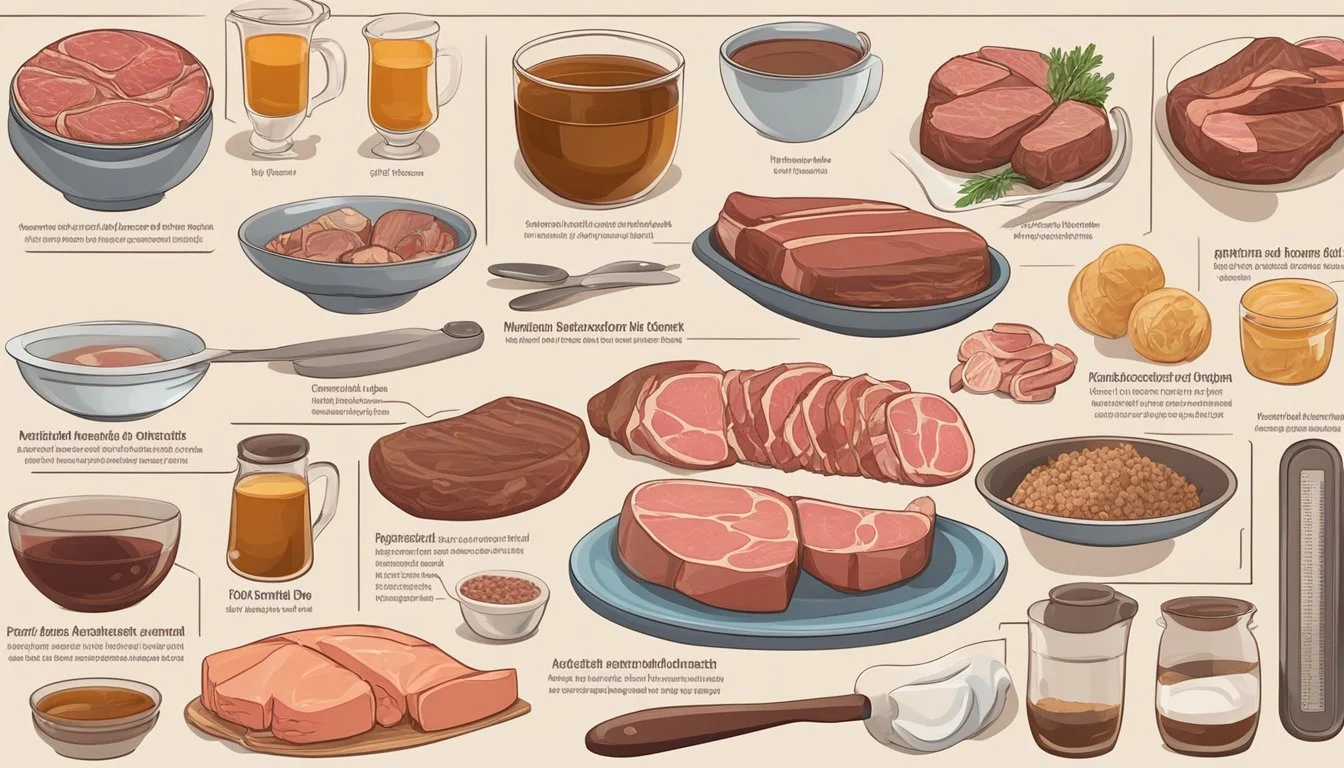Maximizing Nutrient Uptake on the Carnivore Diet
Optimal Strategies for Enhanced Health
The carnivore diet, focused solely on the consumption of animal products, touts simplicity and has been linked with various health benefits, including improved energy levels. Its framework consists mainly of meats, seafood, eggs, and limited dairy foods. Proponents claim that the diet's high nutrient density — the ratio of essential nutrients relative to the calorie content of the food — contributes to its purported benefits.
Optimizing nutrient uptake on this diet means ensuring that the body receives all the required vitamins, minerals, and amino acids. While ruminant meats such as beef, lamb, goat, bison (What wine goes well with bison?), and buffalo are favored for their nutritional profiles and better rearing conditions, challenges can arise, such as meeting the recommended intake of nutrients that are less abundant in animal products, like iodine, magnesium, and manganese.
Adherents of the carnivore diet often have to pay close attention to these potential gaps. The inclusion of organ meats and the consideration of supplementation, particularly for iodine which has been added to table salt to prevent deficiencies, are strategies that can be employed. A mindful approach to this restrictive diet is essential, as it is markedly different from diets that include a variety of plant-based foods.
Fundamentals of the Carnivore Diet
The carnivore diet focuses on the consumption of animal products while excluding plant-based foods, emphasizing high intake of protein and fat, and is often considered for weight loss and energy benefits.
Defining the Carnivore Diet
The carnivore diet is characterized by the exclusive consumption of animal products such as meat, seafood, eggs, and limited dairy products. It eliminates all plant-based foods, relying heavily on protein and fat for daily energy needs. This diet is a subset of ketogenic diets, aligning with the body's switch to fat as a primary fuel source.
Potential Benefits of Carnivore Eating
Several benefits have been attributed to the carnivore diet, including:
Weight Loss: The high satiety effect of proteins and the metabolic state of ketosis may contribute to weight loss.
Energy Stability: Due to the constant availability of fat as an energy source, individuals may experience fewer fluctuations in energy levels throughout the day.
It's worth noting that while anecdotal evidence suggests various benefits, the diet's potential impacts, especially in the long-term, require more comprehensive research.
Common Misconceptions and Clarifications
Many believe that a carnivore diet might cause nutrient deficiencies due to the lack of plant-based foods. However, animal products can provide most essential nutrients, although the diet may fall short in providing certain vitamins and minerals found abundantly in plants. It is crucial to ensure a varied intake of different meats and organ meats to maximize nutrient uptake within the constraints of the diet.
Nutrient Profiling in Animal-Based Foods
The carnivore diet prioritizes animal products, which are rich sources of both macro and micronutrients essential for human health. Properly understanding the nutrient profile of these foods can maximize nutrient uptake.
Macro and Micronutrient Breakdown
Animal-based foods provide a comprehensive array of nutrients. These include macronutrients such as protein, which serves as the building block for muscles and tissues, and fat, which offers energy and supports cell growth. On the micronutrient side, animal products are packed with vitamins like B12 and D, minerals such as iron, zinc, and selenium, and other bioactive compounds crucial for optimal body function.
Nutrient Type Examples in Animal Foods Protein Beef, chicken, fish Fat Saturated, monounsaturated, omega-3s Vitamins B12 in liver, Vitamin D in fatty fish Minerals Iron in red meat, Zinc in shellfish (What wine goes well with shellfish?)
Role of Organ Meats
Organ meats, especially the liver, are nutrient powerhouses. Liver provides an impressive concentration of vitamin A, B vitamins, iron, and copper. Organ meats in general boast higher nutrient densities compared to muscle meats, making them a pivotal component of the carnivore diet.
Nutrient Contribution of Organ Meats
Liver:
Nutrient Contribution: Vitamin A, B12, Iron
Kidney:
Nutrient Contribution: B2 (Riboflavin)
Heart:
Nutrient Contribution: Coenzyme Q10
Importance of Fat and Muscle Meat Composition
The composition of an animal's muscle meat—specifically the fat content—influences the nutrient profile. Fatty cuts of meat ensure intake of essential fatty acids and fat-soluble vitamins, which are critical for many bodily functions including hormone production. The ratio of omega-3 to omega-6 fatty acids in meat affects inflammation and overall health, and the preference should be for meats with a favorable omega-3 profile.
Nutritional Aspects by Meat Type
Fatty Cuts:
Nutritional Aspect: Higher Omega-3s, Fat-soluble vitamins
Lean Cuts:
Nutritional Aspect: Lower fat, but rich in protein
Optimizing Nutrient Absorption
When adopting a carnivore diet, focused almost exclusively on animal products, one's approach to optimizing nutrient absorption should center around digestive efficiency, the nutritional quality of meat varieties, and cooking methods that preserve nutrients.
Digestive Efficiency for Meat
Digestive efficiency for meat is critical on a carnivore diet. Saturated fats, found abundantly in red meats (What wine goes well with red meat?) such as steak, are crucial for absorbing fat-soluble vitamins. To support this process, individuals need to ensure adequate hydration; water aids in the digestive process. Consuming meat alongside eggs, which are rich in choline, may also support liver function and thereby optimize digestion.
Incorporating High-Nutrient Varieties
One can maximize the nutrient profile of a carnivore diet by incorporating a diverse range of high-nutrient meats. Organ meats, for instance, are packed with vitamins and minerals. To manage calorie intake while ensuring nutrient density, one might prioritize lean cuts of meat and consider the balance between muscle meats and organ varieties.
Organ meats: High in vitamin A, D, E, and K
Lean meats: Provide protein with fewer calories
Cooking Methods and Nutrient Retention
Cooking methods greatly influence nutrient retention in meats. Techniques such as sous-vide or slow-cooking can preserve the integrity of proteins and fats, ensuring that water-soluble vitamins are not lost. Seasoning with simple spices such as salt and pepper can enhance the natural flavors without introducing additional calories or reducing the nutrient content.
Sous-vide: Retains moisture and nutrients
Slow-cooking: Minimizes nutrient loss at lower temperatures
Seasoning: Salt and pepper to enhance flavor without excess calories
Addressing Potential Dietary Gaps
In a carnivore diet, careful consideration is necessary to counterbalance potential nutritional deficiencies. By understanding and addressing these gaps, individuals can take proactive steps to maximize their nutrient intake.
Counteracting Vitamin and Mineral Shortages
Vitamin C: Although often associated with fruits, Vitamin C is available in organ meats such as liver. To meet the Recommended Dietary Allowance (RDA), consuming these organ meats regularly can help prevent deficiencies like scurvy.
Micronutrients from Animal Sources and Their Notes
Vitamin C:
Animal Source: Liver, Kidneys
Notes: Crucial for preventing scurvy and aiding in collagen synthesis.
Magnesium:
Animal Source: Fish
Notes: Important for many biochemical reactions in the body.
Calcium:
Animal Source: Dairy, Bones
Notes: Essential for bone health.
Zinc:
Animal Source: Meat, Shellfish
Notes: Vital for immune function and metabolism.
Iron and Zinc: Red meat and shellfish are excellent sources of these minerals, which are vital for maintaining robust immune function and overall metabolism.
Dealing with Lack of Fiber
While a carnivore diet excludes traditional sources of fiber, such as fruits and vegetables, the focus on gut health remains paramount. Consuming bone broth and fermented animal products can support a healthy gut microbiome. Although not a direct replacement for fiber's role in managing blood sugar and promoting satiety, these foods contribute to gut health.
Implementing Intermittent Fasting
Intermittent fasting can be incorporated to potentially stabilize blood sugar levels and support metabolic health. A defined eating window encourages the body to switch from glucose as a primary fuel source to utilizing stored fats, which can be beneficial on a diet devoid of plant-based carbohydrates. This approach may also indirectly address some health issues associated with traditional high-carbohydrate diets.
Physical Activity and the Carnivore Diet
Engaging in regular physical activity while adhering to the carnivore diet demands careful consideration of protein intake, muscle maintenance, and the balance of hydration and electrolytes to optimize health outcomes.
Exercise and Protein Intake
The carnivore diet provides ample protein which is vital for repairing and building muscle tissue post-exercise. Protein should be consumed within a window of 30-60 minutes after a workout to support optimal muscle recovery. This diet typically involves high levels of meat consumption, offering a rich supply of essential amino acids necessary for muscle synthesis.
Building and Maintaining Muscle Mass
Consuming a carnivore diet, one can attain the required nutrients to support muscle mass maintenance and growth. It's crucial to focus on varied meat intake to provide a range of necessary nutrients like protein, vitamin D, zinc, and iron which are instrumental for muscle and bone health. Resistance training exercises are recommended to enhance muscle growth and bone density while on this diet.
Hydration and Electrolyte Balance
Individuals on the carnivore diet must ensure they are well-hydrated and maintain electrolyte balance. Hydration is key, especially after exercising, to replace fluids lost through sweat. Including animal-based foods rich in potassium and regularly consuming bone broth can supply essential electrolytes like sodium, potassium, magnesium, and calcium, which are pivotal for muscle function and preventing cramps.
Carnivore Diet Variations and Customizations
The Carnivore Diet focuses predominantly on animal products; however, individuals can customize it to optimize nutrient uptake. Specific inclusion of dairy, eggs, selective seafood, and seasonings can cater to dietary preferences and nutritional profiles.
Including Dairy and Eggs
Dairy and eggs can enhance the nutritional value of the Carnivore Diet while providing variety. They are excellent sources of calcium, vitamins A, D, B2, B12, and beneficial fats. However, some individuals may choose to limit dairy due to lactose sensitivity. For those who can tolerate dairy, options include:
Butter: Rich in vitamins A, D, and E.
Heavy cream: Low in lactose, good source of fat-soluble vitamins.
Hard cheeses: Minimally lactose, high in calcium and protein.
Eggs are a complete source of essential amino acids and contain:
Choline: Crucial for liver function.
Selenium: An antioxidant that supports immune function.
Vitamins D, B12: Vital for bone health and energy metabolism.
Selective Seafood Inclusion
Seafood is an integral component of some Carnivore Diet variations, offering high-quality protein and omega-3 fatty acids, which are important for cardiovascular and brain health. Fatty fish are especially nutrient-dense:
Salmon, mackerel, sardines: High in omega-3s, vitamin D, and selenium.
White fish (cod, halibut): Low in fat, high in protein.
Seafood selection is crucial for those aiming to increase intake of specific micronutrients without deviating from the Carnivore Diet's principles.
Spices and Seasonings
To enhance the palatability of meals without adding carbohydrates, spices and seasonings can be used sparingly:
Salt: Iodized salt can also contribute to iodine intake.
Pepper: Contains antioxidants and may aid digestion.
Using spices and seasonings can make adherence to the Carnivore Diet more sustainable, as they add variety and enhance flavor while maintaining the diet's no-carbohydrate rule.
Practical Considerations and Meal Planning
When embarking on the Carnivore Diet, individuals must pay attention to meal planning, shopping, and managing social situations to ensure adequate nutrient intake while adhering to dietary constraints.
Budgeting and Shopping Tips
One needs to consider cost-efficiency when purchasing high-quality meats, which are central to the Carnivore Diet. Buying in bulk and opting for less expensive cuts of meat or offal can provide both economic and nutritional benefits. Regularly checking for sales and discounts at local butchers or supermarkets can further help manage expenses. Additionally, prioritizing the purchase of seasonal seafood can reduce costs while providing variety.
Plan weekly meals to calculate exact quantities, avoiding waste.
Invest in a good freezer to store bulk purchases.
Sample Meal Plans and Recipes
A sample day on the Carnivore Diet could include:
Breakfast: Scrambled eggs with slices of bacon (how long does bacon last?)
Lunch: Grilled ribeye steak
Dinner: Roast chicken with bone broth
Recipes focus on simplicity and high protein content:
Bacon-Wrapped Asparagus: Wrap asparagus with bacon and bake until crispy.
Butter-Basted Pork Chops: (What wine goes well with pork chops?) Fry pork chops in butter, basting regularly.
Eating Out and Social Situations
Diners adhering to the Carnivore Diet can navigate eating out by focusing on plain meat dishes and requesting modifications as needed. Being clear with restaurant staff about dietary preferences assists in avoiding hidden additives or garnishes. Socially, one can partake in gatherings by selecting meat-centric options or bringing their own dish, ensuring they stick to their dietary choices without compromising social interactions.
Ask for meat dishes to be cooked without vegetable oils or seasonings.
Carry snacks like jerky or hard cheese for unplanned situations.
Long-Term Sustainability and Health Monitoring
The carnivore diet raises questions about long-term health outcomes and environmental sustainability. Due to absence of certain food groups, consistent health monitoring is crucial, alongside considerations of the diet’s ecological footprint and the potential for future research to optimize its practice.
Monitoring Health Markers
Individuals on the carnivore diet should have regular blood tests to monitor markers of health, including cholesterol, blood pressure, kidney function, and micronutrient levels. This proactive approach identifies potential nutrient deficiencies or health issues early. For example:
Lipid profile: Checking for elevated LDL cholesterol which could indicate increased cardiovascular risk.
Renal function: Ensuring the kidneys are managing the high protein intake effectively.
Nutrient levels: Screening for deficiencies, such as Vitamin C and fiber, commonly found in plant foods.
Sustainability and Environmental Considerations
The environmental impact of a meat-centric diet includes higher greenhouse gas emissions and resource consumption compared to plant-based diets. Key sustainability considerations encompass:
Greenhouse Gas Emissions: The production of meat, especially beef, generates significant greenhouse gases.
Resource Use: Livestock farming is resource-intensive, requiring substantial land and water.
Adopting practices like locally sourcing meat and choosing grass-fed options can potentially mitigate some environmental consequences.
Future Research and Developments
As the carnivore diet is relatively novel with a limited body of research, future studies are essential to understand its long-term health implications. Ongoing research should focus on:
Nutrient bioavailability: How effectively nutrients from an all-meat diet are absorbed and utilized by the body.
Dietary patterns: The impact of variations within the carnivore diet on different health outcomes.
It is imperative to investigate the ecological viability of such diets and understand how they fit into a sustainable food system.
Personal Experiences and Case Studies
This section delves into first-hand accounts and research-backed insights on the carnivore diet, analyzing its impact through the lens of those who've experienced it and the experts who've studied it.
Success Stories and Testimonials
Individuals report significant health improvements while following a carnivore diet. They typically describe benefits in weight management, enhanced mental clarity, and resolution of digestive issues. These anecdotes often tell of overcoming long-standing health problems where other diets have failed.
David: After adopting a carnivore lifestyle, he observed a marked improvement in his energy levels and a reduction in autoimmune symptoms.
Sarah: She shares how the diet has played a pivotal role in managing obesity and diabetes more effectively than her previous dietary interventions.
Common Challenges and Solutions
While success stories are compelling, adherents to the carnivore diet sometimes face hurdles. Nutritional deficiencies, such as a shortage of fiber and certain vitamins, are potential issues. To counter these, individuals often turn to organ meats and bone marrow, which are rich in nutrients like vitamin A and D, and calcium. They also advocate for the inclusion of omega-3 fatty acids through fish consumption.
Vitamin Supplementation: For those concerned with vitamin intake, some take targeted supplements to fill potential gaps.
Community Support: Online groups provide platforms for carnivores to share advice on overcoming barriers like dietary monotony or social dining challenges.
Expert Opinions and Scientific Endorsements
Medical professionals and researchers weigh in on the diet's efficacy, albeit with a cautious approach due to limited long-term study data. Harvard studies have documented participants' improved metabolic markers following the diet, while expressing the need for more comprehensive research.
Dr. Ludwig from Harvard Medical School: Notes that while the diet's high-fat content has shown to improve certain health markers, one must consider individual variability and the importance of medical supervision.
Pennington Biomedical Research Center's Findings: Highlight the potential of the diet in weight management and metabolic health but emphasize the necessity for larger-scale, peer-reviewed research.







